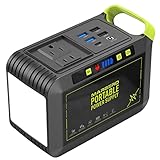Understanding the power output of portable generators is crucial for selecting the right unit for your needs. Here, we cover various generator types, applications, and essential considerations to help you make an informed decision and ensure you get the most value and utility from your investment.
Types of Portable Generators
The market offers several distinct types of portable generators, each suited for specific applications. When comparing propane vs gas generators, you’ll find each fuel type has unique advantages. Modern inverter generators provide clean power ideal for sensitive electronics, while traditional models offer robust power for heavy-duty applications. The choice between fuel types often depends on availability, cost, and specific power requirements.
Solar generators represent a green alternative to conventional fuel-powered units. These eco-friendly portable power products produce no emissions and operate silently, making them perfect for indoor use and environmentally conscious consumers. The Champion 200961 dual-fuel inverter exemplifies how modern generators can offer fuel flexibility while maintaining clean power output. This versatility becomes particularly valuable during emergencies when fuel availability might be limited.
Sizing and Power Requirements
Proper sizing is crucial for reliable operation and long-term satisfaction with your generator purchase. Understanding generator noise levels helps in selecting a unit that won’t disturb neighbors or violate local noise ordinances. The Honda EU2200i, for example, offers an excellent balance of power and quiet operation for residential use, making it a popular choice for homeowners seeking reliable backup power.
When choosing the right DuroMax generator or similar units, consider running and starting watts for all intended applications. The DuroMax XP12000EH demonstrates how dual-fuel capability can provide flexibility while maintaining substantial power output. This versatility becomes particularly valuable during extended power outages or in areas where fuel availability might be limited.
Selection Criteria
Your selection should be based on specific needs and applications, considering both immediate requirements and potential future needs. For outdoor events, portable generator considerations include runtime, noise levels, and power capacity. Properly matching generator capacity to expected loads ensures efficient operation and prevents overloading.
Pairing generators can provide additional capacity when needed, though this requires compatible units and proper setup. This flexibility allows users to expand their power capability as needs grow rather than immediately investing in a larger, more expensive unit. Modern generators often include features that facilitate parallel operation, making this option increasingly accessible.
Safety and Operation
Safety remains paramount, particularly regarding portable generators and carbon monoxide risks. Proper placement and ventilation are essential for safe operation, requiring careful consideration of operating location and environmental conditions. Modern units often include advanced safety features, but proper operation remains crucial for preventing accidents.
Portable generator storage between uses also affects long-term reliability and safety. Proper storage procedures, including fuel system management and environmental protection, help ensure your generator remains ready for use when needed. Regular maintenance and testing further contribute to reliable operation and long service life.
Applications
Different applications require specific generator characteristics, and understanding these requirements helps ensure appropriate selection. For home backup power, modern inverters provide clean power for sensitive electronics and appliances. Consider units with automatic voltage regulation and sufficient capacity for essential household loads, ensuring reliable operation during power outages.
Recreational applications demand different characteristics from generators. Lightweight, quiet operation becomes crucial for camping and RV applications. Look for fuel-efficient models with appropriate power output for your needs, considering factors like portability and runtime requirements. Powering various devices while maintaining acceptable noise levels makes certain models particularly well-suited for recreational use.
Professional applications present their unique challenges and requirements. Commercial users need reliable power with extended runtime capabilities. Heavy-duty construction and commercial-grade components ensure durability under demanding conditions. The ability to withstand continuous operation and harsh environments becomes crucial for these applications.
Understanding how different generators serve various applications helps in making an informed selection. When evaluating different models, consider factors like frequency of use, operating environment, and specific power requirements. The right generator should provide reliable power while meeting all practical requirements for your intended use.
Conclusion
By carefully evaluating these aspects and considering your specific needs, you can select the perfect portable generator for your situation. Remember that initial cost represents only part of the total ownership experience – factors like fuel efficiency, maintenance requirements, and reliability significantly impact long-term satisfaction with your generator purchase.
Regular maintenance and proper operation ensure your generator provides reliable service throughout its lifetime. Following manufacturer recommendations for maintenance schedules and operating procedures helps prevent problems and extends service life. This attention to proper care and operation maximizes your return on investment while ensuring your generator remains ready for use when needed most.
FAQs
What safety precautions should I take when using a portable generator?
Can I run my whole house on a portable generator?
How do I maintain my portable generator to ensure optimal performance?







Leave a Reply